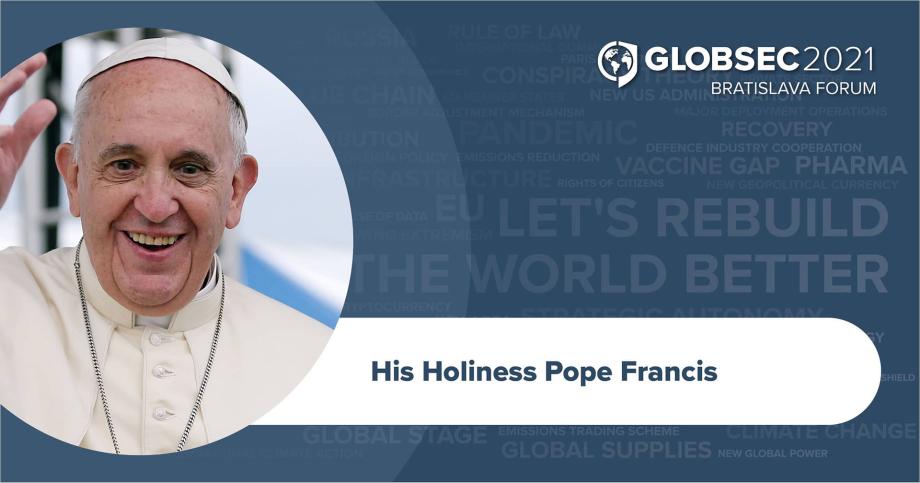GLOBSEC 2021: Pope Francis's Video Message

After Pope Francis's message at GLOBSEC 2021, read below his full speech:
Mr President,
I thank you for your kind invitation to participate through this video message in the 16th edition of the GLOBSEC Bratislava Forum on the theme: Building the World Back Better. In greeting you, the organizers and all taking part in this gathering, I express my appreciation for the platform that the Bratislava Forum offers for the important discussions taking place on the rebuilding of our world following the experience of the COVID-19 pandemic.
The pandemic has forced us to confront a number of serious and interrelated social, economic, ecological and political issues.
For my part, I would like to propose some points for reflection inspired by the threefold method that encourages us to “See, Evaluate and Act”.
To See a serious and honest assessment of the past – including the acknowledgement of systemic failures, past errors and lack of responsibility with regard to the Creator, our neighbour and all creation – strikes me as essential for the development of a model of recovery aimed not only at rebuilding what was, but also correcting the things that were not working, even before the advent of the coronavirus and that ended up making the crisis worse.
Getting up after any fall requires facing the reasons why we fell and acknowledging the extent to which we, ourselves were responsible.
What I see is a world that allowed itself to be duped by a false and arrogant sense of security based on a thirst for profit.
I see a model of economic and social life marked by many forms of inequality and selfishness where a tiny minority of the world population possesses most of its wealth and does not hesitate to exploit people and resources.
I see a way of life that is insufficiently concerned for the environment. We have grown accustomed to consuming and destroying at will what is the property of all and must be respected as such; in this way, we have created an “ecological debt” to be borne above all by the poor, and by future generations.
To Evaluate. A second step is to evaluate what we have seen. In my greetings to the Roman Curia last Christmas I offered some reflections on the significance of the crisis, which has opened up new possibilities, challenging us, as we consider our present situation, to turn a time of trial into a moment of decision.
Every crisis forces us to choose, for better or worse.
As I said, we never emerge from a crisis exactly as we were, we come out of it either better or worse. But never the same.
Evaluating what we have seen and experienced pushes us to become better. Let us take advantage of the present moment to press forward.
The crisis has reminded us that no one is saved alone, it points us towards a future in which the equality of every human being is acknowledged not only in theory but in practice, providing individuals and peoples with equal and real opportunities for development.
To Act. If we fail to act, we will squander the opportunities presented by the crisis. Acting in response to social injustice and marginalization calls for a model of development centred on “each person and the whole person” as “the fundamental pillar to be respected and protected through the adoption of a methodology that embraces the ethics of solidarity and political charity”.
Every way of acting calls for a vision, a global vision of hope like that of the biblical prophet Isaiah who saw swords turned into ploughshares and spears into pruning hooks.
To act for the development of everyone entails undertaking a process of conversation and, above all, making decisions capable of converting death into life, weapons into food.
All of us likewise need an ecological conversion. A global vision entails viewing creation as our “common home” and requires that we act urgently to protect it.
Dear friends, moved by the hope that comes from God, I pray that your discussions these days will contribute to a model of recovery capable of generating more inclusive and sustainable solutions, a model of development based on peaceful coexistence and on harmony with all creation.
I offer you my best wishes for your work, and I thank you.